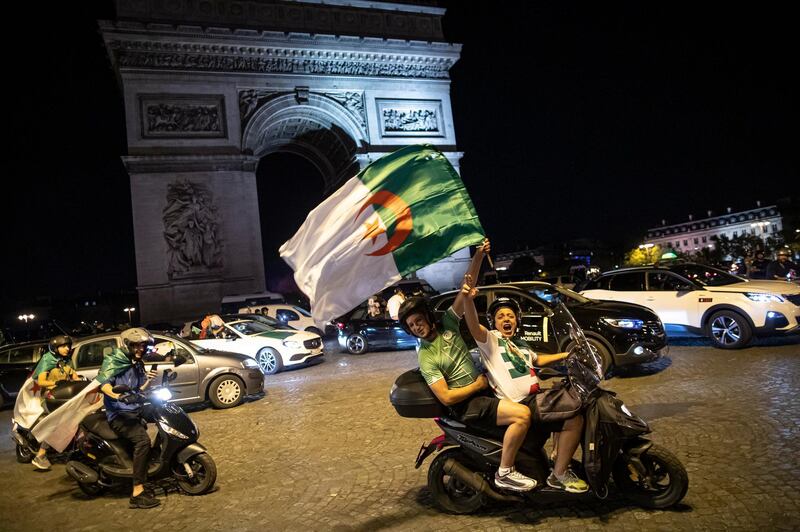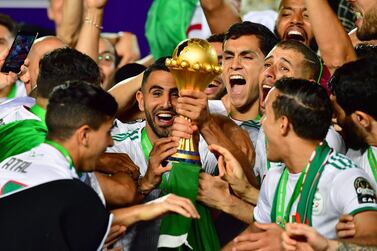The Cairo International Stadium was the obvious place for me to watch my team, Algeria, win the final of the Africa Cup of Nations last Friday. I have good friends and professional contacts in the Egyptian capital, and could easily have swung a ticket.
Despite this, there was really only one place I wanted to be to watch the victory over Senegal, and that was Paris. I was at infant school in the French capital when we won the same trophy in 1990, and have associated the city with the Fennecs, which means “Desert Foxes”, ever since.
There have been breathtaking highlights for supporters of the Algerian national side, not least coming very close to eliminating Germany, the eventual champions, in the World Cup five years ago. Gary Lineker politely described us as “a credit to African football”, but Hugh Laurie, the charming British actor, was far more precise, tweeting: “Algeria, just plain bloody heroic”.
Those words perfectly encapsulate the history of a North African country that was part of France for 132 years, up until 1962. There was a horrific war of independence, with the French doing everything possible to defeat a burgeoning nationalist movement.
The Algerian diaspora in France suffered immense persecution, up to and including killing, terrorism and torture.
The subjugation was particularly unpleasant in Paris, where the city police drowned Algerian protesters in the Seine, or beat them to death. The massacres – which left hundreds dead – described by British historians as “the bloodiest act of state repression of street protest in western Europe in modern history” – took place around famous bridges, Metro stations and monuments.
These are places where I find myself thinking about those who died in campaigns of slaughter that the French establishment spent decades trying to cover up.
Most of the Paris-based Algerians killed during the war came from work camps in the suburbs that later developed into the kind of underfunded housing estates where their surviving families live today. Riyad Mahrez, the Fennecs captain and Manchester City star, is from Sarcelles; the brilliant former West Ham United midfielder Sofiane Feghouli is from Levallois-Perret.
I know both players. We were born and brought up in adjoining towns, and shared the same experiences as we grew up. So did the thousands of others I joined on the Champs-Elysees for celebrations on the way to the final, and afterwards. These were all-night parties that we will never forget – fireworks, bangers, red-white-and-green flags, traditional songs and dances, and chants of “One-Two-Three, Viva l’Algerie!”
The words of the historic uprisings against France were “One-Two-Three, We Want to be Free!” Algeria was not allowed a national team under French rule, leading to superb Algerian players refusing to wear the blue of France.
A breakaway Equipe FLN (Team FLN), representing the National Liberation Front, contested matches from just before the 1958 World Cup, lifting morale among combatants and civilians alike. The country’s first president, Ahmed Ben Bella, not only played for Marseille, but scored on his debut. He could have been a professional footballer, but affairs of state beckoned.
After 1962, Ben Bella took a key role turning Equipe FLN into the Fennecs, and they were recognised by Fifa a year later. This sense of football-related patriotism drives the kind of incredible outbursts of joy displayed on the Champs-Elysees.
Post-colonial tension has by no means ended in France. Anyone who has Algerian links will still experience discrimination in many aspects of their lives. Some politicians refer to a quasi-apartheid system that works against ethnic minorities, particularly those from Arab Muslim backgrounds.
The extreme-right Front National party, last year renamed the Rassemblement National, or National Rally (NR), was founded by ex-soldiers furious at the loss of Algeria, not least of all Jean-Marie Le Pen – father of the party's present-day leader, Marine Le Pen – now a convicted racist and anti-Semite. That an organisation with such disturbing antecedents remains massively popular says everything about what Algerians are up against.
The NR even politicised the victory celebrations as Algeria won all their games in Egypt. Rather than images of euphoric men, women and children, they focused on incidents of fighting, vandalism and looting. Never mind that you inevitably get ugly flashpoints when France or Paris Saint-Germain supporters are celebrating, nor that English clubs such as Chelsea overdo it when they are in town. When young Algerian men are involved, everything is weaponised.
That is why there were fabrications about an Algeria fan killing a young mother with his car in the southern city of Montpellier last week. The driver in this appalling and tragic road accident had nothing to do with the Fennecs. That is why nobody in the mainstream French media mentioned Algeria fans as young as six being tear-gassed on the Champs-Elysees, as their mothers tried to protect them.
Algerians have been through decades of war and political upheaval, and it does not stop. We are acutely sensitive to repression and conflict in other Arab lands, not least in countries such as Iraq, Palestine, and Syria.
Our team’s success distracts us from such horrors, but it by no means allows us to forget them. Yes, the young Algerian team that won in Egypt represents sporting brilliance, but it was also imbued with an indomitable spirit that it shares with its fans. Winning the tournament last Friday ensured that the whole world was reminded of this.
Nabila Ramdani is a French-Algerian journalist and broadcaster who specialises in Islamic affairs and the Arab world






